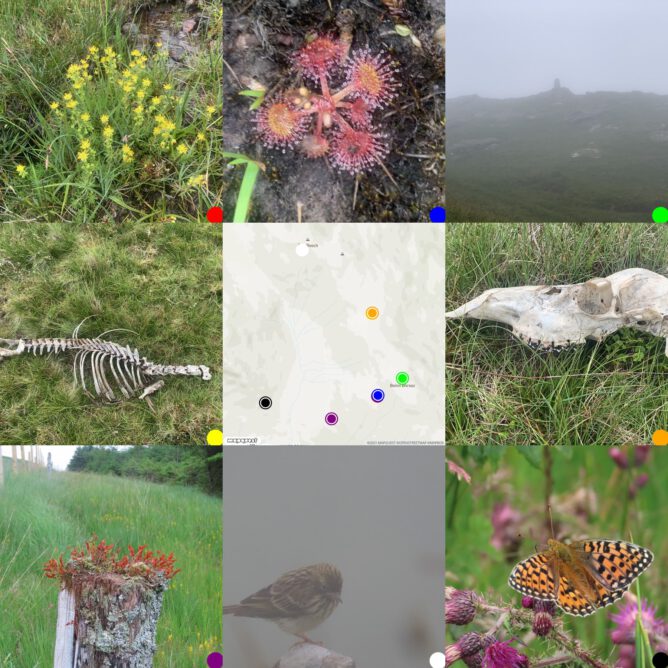Read: Scabby Queen by Kirstin Innes ★★★★☆ 📚
Multi narrator life story of Clio, Scottish singer & activist. Starts at her end in 2018. Revisiting most of the narrators and scenes revels more & more about all the characters.
Read: The Heartbeat of Trees
Read: The Heartbeat of Trees: Embracing Our Ancient Bond with Forests and Nature
by Peter Wohlleben, Jane Billinghurst(Translator)
★★★★☆ 📚
New science about trees back up with references mixed with personal rumination and experiences. The good trees do for us and the planet and the bad we do to them.
Some really fascinating snippets about tree biology too:
The trick to living another couple of decades or even centuries is to compost yourself. Fungi that enter via a wound in the tree convert the wood into a sort of humus as they eat their way through the tree, creating debris that is soft, crumbly, and moist. Now the tree can grow inner roots into this “soil” and reabsorb nutrients it stored in earlier years in its growth rings.
Read: Luckenbooth by Jenni Fagan ★★★☆☆ 📚
A novel Maddox up of short stories over 100 years linked by a Edinburgh tenement. Gothic, ghosts, queer, beat, crime and more. Some seemed to flow for me better than others. Probably best read in fewer sessions than I did.
15+ alternatives to using laminates outside https://bit.ly/36H66ht Always on the look out for good ideas here. #EYShare #EYMatters, #EYTwittertagteam, #EYFS, #EarlyYears, #TeamEarlyChildhood #EYBLUK#edutwitter #EYMaths #continuousprovision #eyideas
Read: Why coding should at the centre of the curriculum
Coding develops cognitive skills, problem solving and analytical thinking (“computational thinking”). By introducing and developing these abilities from primary school onwards, we create the building blocks and thought processes necessary for robotics and AI. This is not about displacing traditional subjects but, rather, changing the emphasis. Coding can comfortably sit alongside other subjects, especially those with a creative slant, reinforcing the development of key skills through multiple channels.
Digital skills: Why coding should at the centre of the school curriculum | Tes
Coding certainly can develop cognitive skills, problem solving and analytical thinking. A lot of other things can too. I think it is difficult.
Any class will present a wide range of learners. Designing or adapting lessons to try and get as many of them in the right zone to develop these skills is tricky. If you don’t get this right coding is neither productive or fun.
The article notes:
. Coding can comfortably sit alongside other subjects, especially those with a creative slant, reinforcing the development of key skills through multiple channels.
I’ve certainly found that putting coding into a context can lead to more fun and success. By adding elements art or making to a coding project more pupils are involved in problem solving, collaboration and creativity.
A difficulty in managing this might be the perceive need to be an expert in several different areas. I’ve certainly found myself in situations where I’ve not be completely confident around some of these areas.
The article acknowledges that covid has had an effect:
It is a reasonable assumption that this immersion in IT and technology is preparing young people for a digital future and teaching them the skills they will need.
But we need pupils to be creators as well as users:
there is a largely unrecognised digital difference between the users of technology and the creators
I think there is also a gap around literacy and the problems that the mixing of commercial and educational interests in technology. A lot of the uptake in digital solutions lacks any questioning of the provides of these solutions.
This is something I am not very sure I’d know where to start with? Perhaps Coding is not ‘fun’, it’s technically and ethically complex:
In just a few years, understanding programming will be an indispensable part of active citizenship. The idea that coding offers an unproblematic path to social progress and personal enhancement works to the advantage of the growing techno-plutocracy that’s insulating itself behind its own technology.
I’m Guy Kawasaki, and this is Remarkable People. This episode’s remarkable guest is David Winer. Dave is a programmer, entrepreneur, writer, and to some, a gadfly. The word ‘gadfly,’ by the way, means “An annoying person, especially one who provokes others into action by criticism.” That’s Dave, all right.
Listened: David Winer – Guy Kawasaki
Really good chat. Covering the birth of blogs, rss, podcasting and outliners.
Talking about the idea that apple networking, if better, could have made the web unnecessary:
David Winer: We had to give up the GUI. We went from having all this great user interface standards to the web, which had no user interface standards.
When I started using computers, a mac 475 and system 7 point something I really found the standardised UI a huge benefit.
Guy Kawasaki: …. but it seems like Apple and Spotify and Amazon, they’re now trying to gate-keep podcasting.
I’ve been podcasting since 2005 and really worry that the medium is being commercialised. Dave Winer was more pragmatic.
Interesting too to compare Dave’s podcasting routine with Guy Kawasaki’s extensive editing:
David Winer: I open up my iPhone, I turn on the Voice Memo app, talk for a while, I email that to myself, I upload it to a server, I put it on my blog. Goodbye.
The wee bit of audio was grabbed by Castro.

Good walk ground the trio of hills in Glen Douglas. Notes, maps & photos: walkmap. I saw a dead hind 2-3 weeks ago, now picked clean.
Dabchick & chick. Only one chick at the moment but the adult’s partner seems to be stuck on a nest.

Twitter lets me know that I joined Twitter 14 years ago today. My blog let me know that on this day in 2011 I was remembering a post from 2007. These posts about facebook and then google plus (remember that) could apply to twitter and other social media silos.
In 2007 I was happy to visit Facebook, I don’t anymore, I hope someday interoperability will mean we don’t need to visit any silo.
Wild salmon was on sale last week at the Harrods luxury store in London for £245 a kilo, making the cost of the average salmon to be over £700, or around £60 for a single portion. Chips would prob…
The conditions that make this so are really depressing. I remember family holidays as a child in the 60s. We would buy a wild salmon for the freezer on the way home. This from netters on Galloway estuaries because the price was so good. I also recall seeing the nets in operation at the mouth of the Spey huge numbers of fish being caught.
